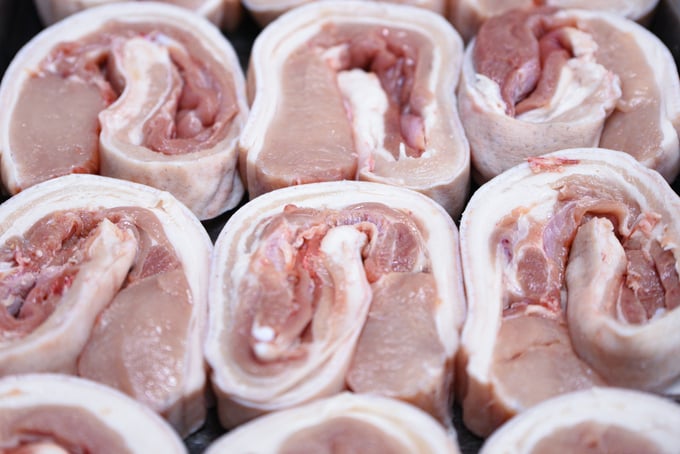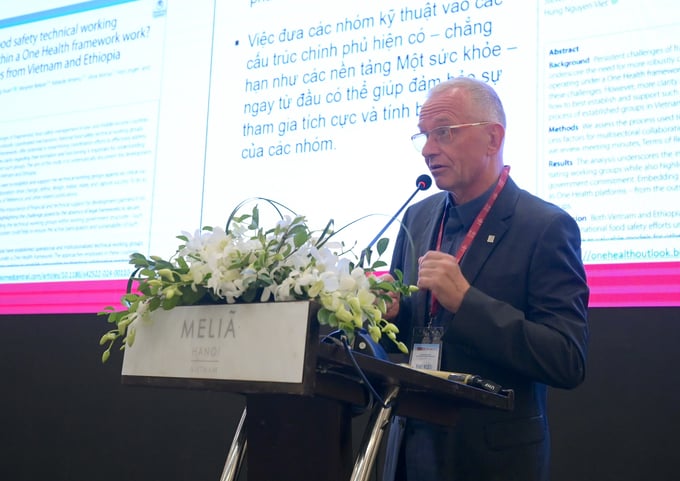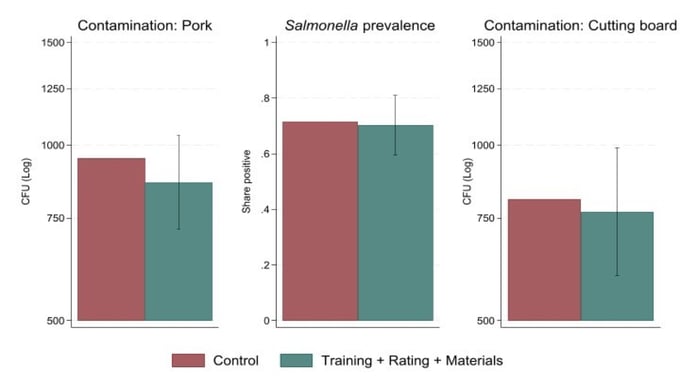December 1, 2025 | 11:37 GMT +7
December 1, 2025 | 11:37 GMT +7
Hotline: 0913.378.918
December 1, 2025 | 11:37 GMT +7
Hotline: 0913.378.918

Food safety interventions at pig slaughterhouses and markets have helped reduce the level of microbial contamination and increased pork meat value. Photo: Tung Dinh.
According to Dr. Fred Unger, the Regional Representative ILRI Asia, the Food Safety Working Group (FSWG) under the framework of OHP Framework, co-hosted by MARD, MOH, MONRE and ILRI, was established in September, 2023.
The working group aims to improve food safety in Vietnam and strengthen the competitiveness of Vietnamese food for domestic consumption and international trade.
Currently, the FSWG consisting of more than 60 organizations, networks, is actively engaging and contributing in responding to food safety in Vietnam. In particular, the group expanded to partner with other NGOs, CSOs, private sectors, and sectoral associations.
Dr. Fred Unger continued that in Vietnam, food safety interventions have been carried out at pork shops of some traditional markets and slaughterhouses. Specifically, in the markets, the plan has been implemented across 5 localities from September 2023 until now, including the provinces of Thai Nguyen, Hanoi, Thua Thien Hue, Dong Nai and Can Tho. Of which, there are 34 trials and 34 control markets focused on pork shops.
The intervention aims to improve food safety practices and knowledge for butchers and reduce the level of microbiological contamination (Salmonella, TBC) at pork shops.
For slaughterhouses, the plan was implemented at small and medium-sized slaughterhouses in 4 localities from July to November 2024, including the provinces of Thai Nguyen, Hanoi, Thua Thien Hue and Can Tho with 8 trials and 8 control pig slaughterhouses. The goal is also to improve food safety practices and knowledge among slaughterhouse workers and reduce levels of microbiological contamination (Salmonella, TBC).

Dr. Fred Unger, ILRI Representative in Asia, shared about food safety interventions in Vietnam. Photo: Tung Dinh.
Dr. Fred Unger stated that after implementing food safety interventions, both action and awareness indicators regarding pork processing and consumption at slaughterhouses and traditional markets increased.
In terms of actions, the scores related to providers ensuring handwashing with soap, clean knives and cutting boards, using easily sanitized tools, and sorting products improved.
The hardware scores pertained to handwashing stations, soap/cleaning agents, disinfectants, and separate knives for different products. Awareness scores reflected the consumer demand for clean and safe products.
Additionally, the total bacterial count on pork samples and cutting boards, along with the rate of Salmonella contamination in pork samples, decreased following the task force's intervention.
Moreover, the revenue of those involved in the food safety intervention increased, as did the value of stored pork and the price of the most popular cut (pork belly).

The level of microbiological contamination decreased (green compared to red) after the food safety intervention. Photo: ILRI.
The activities of the working group in Vietnam have been integrated with community food safety programs and have involved One Health collaboration among healthcare and veterinary sectors, using an interactive food safety training approach.
During the training, vendors showed enthusiasm in participating throughout the process, but lacked the infrastructure to comply with the recommended practices. Business outcomes at the intervention markets improved, and better microbiological indicators were also observed.
"Strong connections with local stakeholders are crucial for uptake and impact," affirmed the ILRI Asia leader.
Through these results, the ILRI Asia Regional Representative suggested that integrating Food Safety Working Group into national processes could be translated into policies and practices to promote food safety.
“These experiences from Vietnam could be useful for other countries in establishing the Food Safety Working Group to improve food safety through coordinated efforts”, said Mr. Fred Unger.
Translated by Kieu Chi

(VAN) The inevitable path forward is to reorganize production along the value chain, utilizing cooperatives as the core, enterprises as the driving force, and farmers as the central subjects.

(VAN) On November 28, Minister Tran Duc Thang, together with China's Minister of Agriculture and Rural Affairs Han Jun, chaired the 2nd meeting of the Viet Nam - China Agricultural Cooperation Committee.

(VAN) Forest carbon credits are only accepted when they ensure absolute environmental integrity, additionality, permanence, and transparency.

(VAN) Viet Nam partners with Beijing on controlling air pollution, cross-regional management, high-tech monitoring and relocating polluting facilities.

(VAN) With a USD 50 million investment, Australia is partnering with Viet Nam to operate its first public electric bus fleet and develop a nationwide EV charging network.

(VAN) On November 28, in Beijing, Minister Tran Duc Thang met Minister of Ecology and Environment of China Huang Runqiu, to share experience on environmental protection.
/2025/11/28/0950-2-120557_751.jpg)
(VAN) The recent flood spell in the South Central region clearly reflects the characteristics of natural disasters in 2025, which are compound, prolonged, and amplified.